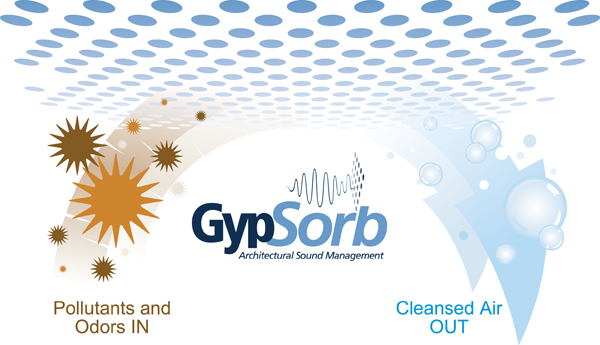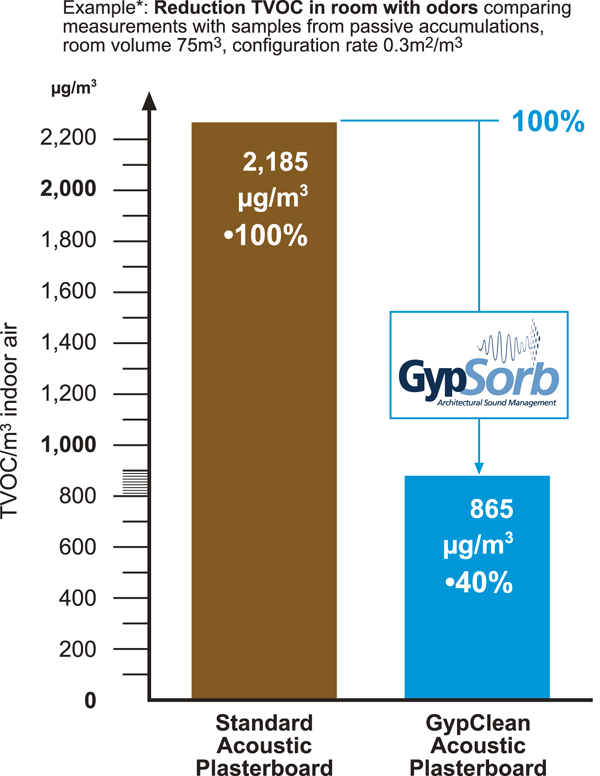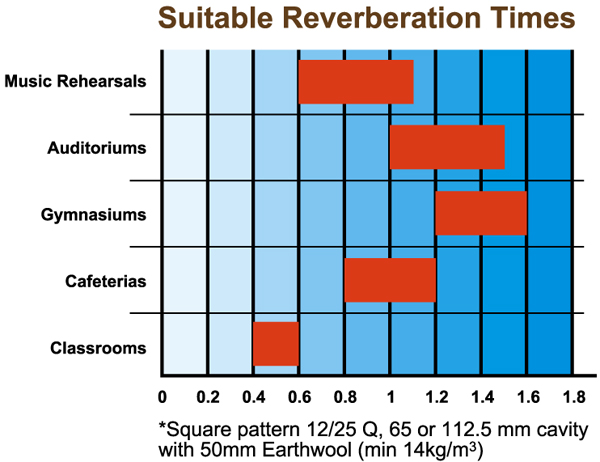The quality of the air we breathe has a profound effect on human health and well being.

GypSorb uses air-purifying GypClean Technology, a perforated plasterboard interior solution that helps to improve indoor air-quality in commonly used spaces.
GypSorb is perforated plasterboard panels that offers acoustic performances of up to NRC 0.95, providing high-level noise absorption treatment for internal ceilings. It also features GypClean air-purifying technology that utilizes dehydrated zeolite to reduce smells and airborne pollutants.
Apart from just being generally unpleasant, poor air quality in buildings can lead to headaches, fatigue and concentration problems. Studies show that we spend up to 90% of our time indoors, so it’s vitally important that we maintain the quality of the air in buildings. But the air in many public and private buildings is heavily contaminated with toxic compounds and unpleasant odors and the problem isn’t confined to offices and residential buildings. Many schools suffer from very poor indoor air quality, which can impact the concentration and performance of students. The air in hospitals can also be contaminated despite so much care being taken to keep wards and operating theaters clean, patients can be exposed to health risks from breathing contaminated air.
Everyday substances including paints and lacquers, cleaning and fabric-care products, perfumes, hair sprays, glues and solvents all create potentially harmful emissions, including a family of chemicals called Volatile Organic Compounds (VOCs), which have been linked to allergies, asthma and even some cancers.
Computers and electronic equipment further contribute to the problem. Even the very materials that a building is made of can release pollutants, from plywood or particleboard to foam insulation and other materials. It’s an unsettling thought that the room you’re sitting in right now, may be silently exhaling a mixture of toxins, including formaldehyde, benzene and trichloroethylene, into the air that you’re breathing.
To make matters worse, in a bid to maximize energy efficiency, many new buildings are effectively airtight cells. As well as effectively containing heat, some modern buildings can trap pollutants in, allowing the contaminants to build up. In most commercial buildings, ceilings and walls provide the greatest surface area interacting with indoor air. When the ceiling or walls are lined with GypSorb Sonus/Strata/Stratum panels with GypClean Technology, cleaner air and a major impact on well being can be achieved.

HOW IT WORKS
GypClean Technology is derived from a natural volcanic rock called Zeolite. Zeolite contains porous minerals with high absorbency and ion-exchange capacity, enabling GypSorb panels to purify air that streams through its perforated surface, removing unpleasant pollutants and helping to improve indoor air quality. And the GypClean effect continues to improve air quality long after installation.
With a three dimensional pore system and pore diameters of less than one millionth of a millimeter, the zeolites help create a gigantic inner surface layer which acts as a naturally occurring ‘sieve’ capable of capturing and removing gas and liquid impurities from the air.
Independent laboratory tests at the Fraunhof Institute for Building Physics in Germany highlight the effectiveness of GypClean products. Demonstrating a significant reduction in the number of airborne pollutants including tobacco smoke, triethylamine, ammonia, formaldehyde, benzene, aromatic hydrocarbons and chlorinated hydrocarbons.
ACOUSTIC PERFORMANCE
GypSorb panel design options combined with noise absorption capabilities make it perfect for a wide range of commercial projects in buildings where we spend a lot of time working, learning, and socializing such as: educational institutions; hospitals; retail spaces; offices; conference halls; and hospitality venues.
The GypSorb panel system is designed to reduce noise reverberation in internal spaces and is available in several perforation patterns for a range of different project design and acoustic needs.
The inclusion of GypClean Technology enables GypSorb to help improve indoor air quality for the benefit of people using and working in those spaces.
GypSorb panels not only improves indoor air quality once installed, but is also sustainable in its material composition, manufacture, and installation. GypSorb panels have been independently tested to confirm compliance with Green Star specification limits for VOCs and formaldehyde 1, and is manufactured from a combination of low embodied energy, non-toxic natural gypsum, and liner paper.
Additionally, GypSorb panels can be installed with a cap screw system, which makes the panels demountable and able to be repurposed, minimizing unnecessary construction waste.
While GypSorb Sonus/Strata/Stratum panel has unique air purifying capabilities; its main function is as an acoustic lining.
 When designing restaurants, offices, hospitals and other public buildings, good acoustics help create a comfortable environment. In a classroom it is important that low frequencies are well absorbed, so that excessive noise does not distract the students from learning. At the same time, the high consonant frequency range should be well reflected since this is essential for good speech intelligibility.
When designing restaurants, offices, hospitals and other public buildings, good acoustics help create a comfortable environment. In a classroom it is important that low frequencies are well absorbed, so that excessive noise does not distract the students from learning. At the same time, the high consonant frequency range should be well reflected since this is essential for good speech intelligibility.
In restaurants large glass facades and hard materials on floors and walls amplify noise, therefore it is important, even in lively restaurants, to spread and dampen the sound in selected places. The degree to which sound is reflected or absorbed can be described by “reverberation time”, i.e. echo within a room. The αw rating, or NRC to a more limited extent, of a product describes how well it absorbs sound and therefore controls the reverberation time. Well designed acoustic products absorb sound evenly across the frequency range, therefore no area of the frequency range has low sound absorption and high reverberation. By using GypSorb Sonus/Strata/Stratum panels, it is not necessary to compromise acoustic performance.
GypSorb Sonus/Strata/Stratum panel lining has excellent sound absorption values across the frequency range and achieves an αw or NRC rating of up to 0.8*, depending on the choice of pattern, use of PolySorb insulation and the void depth. The ideal reverberation time depends on the use of the space and this graph highlights some suggested reverberation times (in seconds) to optimize the acoustic environment.
An important innovation for gypsum contractors and product specifiers, GypSorb perforated plasterboard panels feature the unique UFF edge profile. A superb engineering feature, the GypSorb UFF profile ensures perfect alignment of continuous perforation patterns and, when installed with GypSorb jointing compound, forms a seamless, tapeless joint.
GypSorb panels are an easy choice – addressing today’s building requirements with a functional, aesthetic and sustainable design. It helps reduce waste and complex installation for builders, enables architects to design with flexibility and confidence, and helps create modern, comfortable, and cleaner indoor-air spaces for building occupants.



